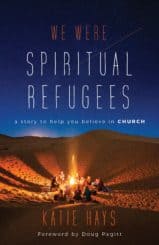
For almost two decades I served small, traditional congregations where heteronormativity was the unspoken rule. In those churches we were attentive to our ethic of hospitality: How can we be more welcoming to them, the people who are our guests? We ran “hospitality audits” that resulted in better signage, cleaner bathrooms, greeters at the front door, and the Lord’s Prayer text printed in every bulletin. We sought ways to help “them” fit in with “us”—as a gesture of Christian friendliness but also to preserve and prolong our way of being.
In my new iteration as the planter of an explicitly LGBTQ-inclusive church, I find that the roles of host and guest have gotten upended. The upset is made concrete in the spaces we rent for worship—five addresses in five years—where none of us is the host but rather all of us are guests in a space we don’t own and can’t monopolize. It’s an equalizer when everybody has to help set up the chairs, find the candles, arrange all the accoutrements that help us remember the sacredness of any place where God is.
It’s an equalizer when everybody has to help set up the chairs, find the candles, arrange all the accoutrements that help us remember the sacredness of any place where God is.
Over these years we have set up weekly communion on a literal bar, pushing the tequila and rum bottles to the side. We have imposed ashes at a coffee shop, with the espresso machine chirring behind us. We have mopped up beer spills from last night’s party so our shoes (and our kids) won’t get so sticky. We have learned to stash the kneeling pillows off the floor so when the rain seeps in under the barn walls, they won’t get soaked.
Moreover, in all these places and more (Easter sunrise huddled under a park pavilion for which we didn’t have a permit, in a rainstorm that pounded the metal roof, making us sing louder and louder and louder!), I have preached, bringing news of such urgent goodness that all of us, together, become breathless with the possibilities of what God might do next. I’m not saying my preaching does it, but when I stand in these weird places, on the margins with my LGBTQ+ friends, these beautiful people made in the image of God but pushed beyond the edges of their families of origin, their schools, the churches of their youth, the whole Texas-red culture, I find myself panting along with them for the justice the prophets promised. I find myself squinting toward the horizon that Jesus forever points to, where the reign of God is “at hand.” We are—all of us, all together—leaning hard into the future that is God’s, wherein God gets everything God wants. We are—all of us together—believing hard that what God wants is us. All of us, together.
In the traditional churches I served, where mostly everybody was straight, cisgender, white, and upper-middle class, there was another us/them dynamic at work in my preaching. I often sided with the Bible against the congregation. If Jesus condemned wealth, I pointed out the congregation’s affluence. If the prophets spoke up for homeless refugees, I shamed the congregants for their bigotry. This kind of preaching is when the preacher says to her church, “Last week the Bible and I got together and talked about you.” I confess it; it’s ugly. But the Bible sides relentlessly with the marginalized against the oppressors, so if your church looks more like the latter than the former, what’s a preacher to do?
The gentler form of that preaching is something like “The Bible is nice to people who are lower than we are, so we should be nice too.” That way the preacher and the church can be together in dreaming up ministries that help us help them. In better seasons, I did that too. Then I could say to the poor of our community, “The church and I got together and decided to do something nice for you.” It’s a different triangulation, more benevolent, but still ugly at its core. Us and them remain firmly fixed categories, and the hierarchy is preserved.
We are—all of us, all together—leaning hard into the future that is God’s, wherein God gets everything God wants. We are—all of us together—believing hard that what God wants is us. All of us, together.
Now imagine Galileo Church, which for this season meets in a corrugated sheet-metal barn with inadequate air conditioning tucked under Interstate 20. People walk in the door to find low lights, flickering candles, mismatched chairs clustered around thrift-store end tables. There’s no pulpit—just a wobbly music stand. No organ—just a solo guitar, spare and lovely. At fifteen minutes till 5:00 we’re still running around, making sure the communion table is set with clean dishes and fresh bread.
Couples come in—two women here, two men there—who are hesitant to show affection to each other anywhere public except here in this cozy space. Families are here—moms, dads, kids, in more configurations than I can count, including some straight couples who found us after their kid came out and their old church kicked them out. Single people are here, wondering who will love their gender-fluid, ever-evolving self, finding friends who are wondering the same. Trans people are the most dressed up people here, enjoying the compliments, feeling strong and beautiful. Everybody who comes in blinks a little, letting their eyes adjust from the bright sun outside. Everybody who comes in releases the tension in their shoulders—I can see it happen—and begins to breathe a little easier.
And I have the enormous honor to stand up in front of them all and say, “This is the word of God for the people of God.” For you! For me! For all of us, together! And in the preaching event we are truly together, they and I, exploring the testimony of our ancestors in faith, listening to Jesus with great anticipation, hoping beyond hope that we will find gospel here, the best possible news: that we are all of us loved, the same.
Once we were not a people,
but now we are God’s people!
Once we had not received mercy,
but now we have received mercy!
~1 Peter 2:10
All of us, together. Amen.
 Silenced along with all women in the church of her youth, Katie Hays was grateful to find traditional congregations that received her ministry for twenty years. In 2013 she quit traditional church to plant and become the Lead Evangelist of Galileo Church in the suburbs of Fort Worth, Texas, a quirky church for spiritual refugees that asks, “Who would Jesus love?” This selection is adapted from We Were Spiritual Refugees: A Story to Help You Believe in Church, by Katie Hays. Reprinted by permission of Eerdmans Publishing.
Silenced along with all women in the church of her youth, Katie Hays was grateful to find traditional congregations that received her ministry for twenty years. In 2013 she quit traditional church to plant and become the Lead Evangelist of Galileo Church in the suburbs of Fort Worth, Texas, a quirky church for spiritual refugees that asks, “Who would Jesus love?” This selection is adapted from We Were Spiritual Refugees: A Story to Help You Believe in Church, by Katie Hays. Reprinted by permission of Eerdmans Publishing.
Note: What a gorgeous portrait of community amidst deep difference, communion that centers those on the edges! If you are interested in an immersive, intimate experience of community across deep difference, check out Oriented to Love, CSA’s program to help Christians understand and connect with each amidst difference in sexual orientation, gender identity, and theological lenses.



One Response
What a wonderful article. With so many Evangelicals such as Franklin Graham endorsing hatred and bigotry, I find it refreshing, as a Christian, to find an Evangelical point of view which squares with my Christian values. I also wonder at the diversity of God’s creations. I am sometimes very sorry to hear some who claim to be Christians, claim they know better than God. Thank you for this reaffirmation.